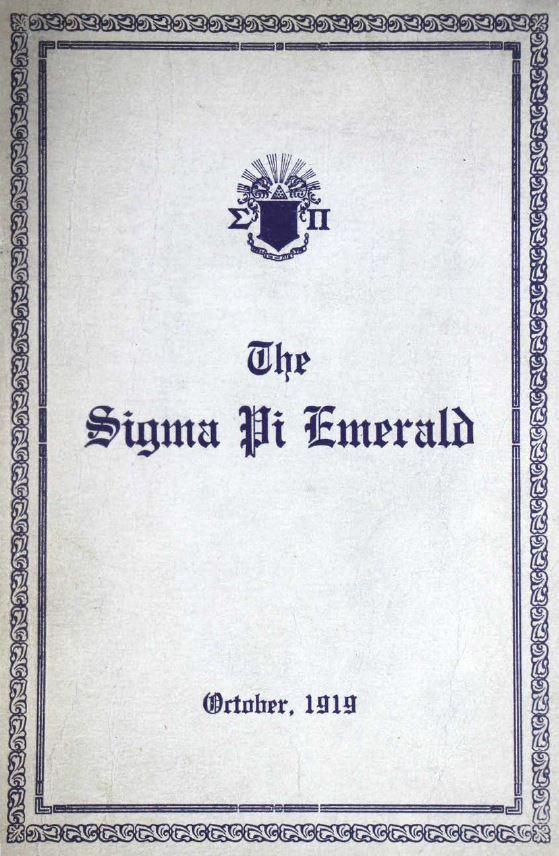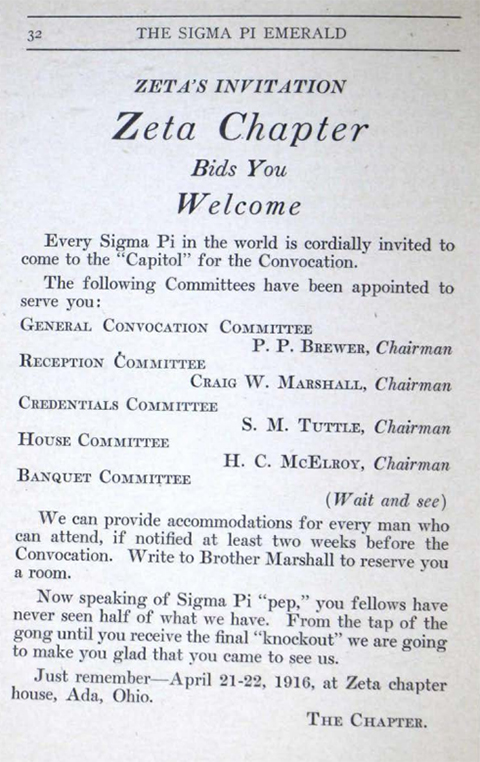In August 2018, I traveled to Indianapolis, Indiana to attend the North-American Interfraternity Conference‘s (NIC) Annual Meeting of Members. The meeting looks and feels like any other professional trade conference complete with a wide variety of vendors and service providers who travel to the event to talk about how they can help your organization succeed. I was very impressed with the wide variety of vendors who were at the conference and I was happy to see some familiar organizations among the vendor tables.
 For example, I stopped at the Phired Up table and had a chance to say hello to some of the newer team members that I have not had the opportunity to meet before. Phired Up played a critical role in the development of several of the Sigma Pi Fraternity chapters in the New Jersey Province that I worked with when I served as Province Archon some 10+ years ago. In fact, based on our wide agreement with the principles in their book, Good Guys, our volunteer team in New Jersey actually hired Phired Up to conduct a regional recruitment workshop for our undergraduate chapters back in Fall 2007 and it was very well-received.
For example, I stopped at the Phired Up table and had a chance to say hello to some of the newer team members that I have not had the opportunity to meet before. Phired Up played a critical role in the development of several of the Sigma Pi Fraternity chapters in the New Jersey Province that I worked with when I served as Province Archon some 10+ years ago. In fact, based on our wide agreement with the principles in their book, Good Guys, our volunteer team in New Jersey actually hired Phired Up to conduct a regional recruitment workshop for our undergraduate chapters back in Fall 2007 and it was very well-received.
At the NIC’s Annual Meeting of Members, I told the young men at the Phired Up table how much Good Guys improved my chapters and they gave me a copy of their Social Excellence book to review. I finished reading Social Excellence quickly – in a matter of days. My big takeaway from this book is that you have to give life a chance! Go out there and take the risk of saying hello to someone, reach out and shake someone’s hand, live a life that is above the norm. The team at Phired Up talks about the four pillars of social excellence in their book. Those four pillars are curiosity, generosity, authenticity, and vulnerability. I want to talk a little bit more about generosity and authenticity in this post, but there is so much that could be said about curiosity and vulnerability. You might consider getting a copy of the book if you want to read more of Phired Up’s take on those two pillars.
On generosity, they write about the power of saying thank you and the power of making a person’s day by giving them something. It is about making someone else’s experience better through your own actions. In my own work with my fraternity, I have tried my best to give back of my time and professional expertise. I have also been a financial supporter of my local chapter, my province, and my international educational foundation. When I mix what I read in Social Excellence with what I know of my own experience as a volunteer and a donor both in my fraternity and with the many other nonprofits that I work with in my state, I find some interesting intersections. For example, it strikes me that the people who are the loudest detractors – those who want to be opinion leaders, but do not have a well-informed opinion – are those who have typically given the least of their time, expertise, and finances to the cause. This is an interesting revelation because it speaks volumes about generosity as a leading indicator on whether or not you are dealing with a well-intentioned individual or someone who just wants the spotlight for the sake of having the light shine on them.
On authenticity and focusing solely on my work for my fraternity, not my work in the larger nonprofit sector, it is critically important to know the true intent of your people before you place any trust in them. Being truly authentic is difficult for some individuals in the fraternity world because they do not have an example on which to model their actions. For example, if you are an undergraduate and your only interactions with alumni advisors have been painfully forcing a smile and a head nod as these volunteers tell stories about their glory days, then your example of being a good alumni volunteer is skewed. Those volunteers are not working authentically to improve your undergraduate experience – their involvement is more about their own experience and reliving what they loved about their time as an undergraduate. Not good.
Authentic alumni volunteers are those who the needs of the undergraduates (or whomever they are helping) before their own need. When I train new alumni volunteers, I give them this advice: if you respond to an undergraduate’s question by saying, “Well, when I was an undergraduate…” then you have immediately lost their attention. When today’s students as you about today’s problems, they want today’s answers. It takes someone who is authentically committed to improving today’s undergraduate experience to build a bridge between yesterday’s experience and the future. This is not easy to do.
You can get better at building that bridge by focusing on improving your social excellence. And a great way to build your social excellence would be to read this book and study these four pillars. I think you will enjoy it!








